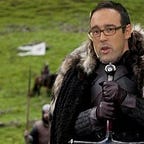On 46
I turn 46 tomorrow. It’s not a monument birthday — more like a way station birthday on the way to 50 (gasp!)and, hopefully, well beyond.
No one — or at least no one I know — has some big party to celebrate their 46th. And I won’t either — unless my wife is extremely good at keeping a secret.
But, just because there won’t be some big celebration doesn’t mean the occasion of me turning 46 years old hasn’t send me inward, trying to better understand myself and the world around me.
And, because I write for a living and find this medium — ahem — still the best one to help me both organize my thoughts and reflect on them, I’ve taken to writing something on or close to my birthday. (It’s a two-year tradition; my reflection on turning 45 is here.)
But what to say about a year like this one, the year when I (and a lot of other people) thought we would be getting back to “normal” in the wake of 2 years of masking and mitigating?
For a lot of the last 365 days, I felt stuck — caught between my ongoing worries about me or my family getting the virus and a desire to just, well, start doing stuff again. (I think I was a slow adopter of the “let’s do stuff again” crowd; lots of people got there before me.)
The more I thought about the last year, the more that word “normal” kept coming up. And the more convinced I became that “normal” is an elusive idea — and one that I have always clung to too tightly.
“Normal” has always been my north star. Growing up an only — and lonely — kid in rural Connecticut, I strove to find the middle and stay there. In high school and in college, I followed the rules and painted in the lines. I hued to the idea that being normal and just like everyone else — was the highest achievement.
In my 20s and even my 30s, being normal still held considerable appeal. The crippling anxiety I first experienced in my mid 20s was driven, in no small part, by my fears that I wasn’t normal.
I remember so many long and sleepless nights where I lay awake haunted by the (obviously false) belief that everyone else in the world was sleeping. If I could just be like everyone else, I would tell myself. If I could just be normal.
When my kids were born, all I ever wanted was “normal.” 10 fingers and 10 toes. Walking and talking when the experts said they should. (I spent months wracked with anxiety when my first son would only offer up “ga” — to describe everything — until he was almost 2.) As they got older, I wanted “normal” experienced at school — friends and fulfillment. To like and be liked.
Undergirding all of those years was a belief that I could control everything. I could make things “normal” by dint of sheer will power and focus. If I followed the established rules perfectly, my reward would be the normalcy I craved.
What the last 2 years done for me — to me? — is explode both the idea of normal and the illusion of control.
It seems that the common conclusion of late when it comes to Covid is that “we aren’t going back to normal.” That the pandemic has changed society — and us — in ways that make a return to the way things were in February 2019 impossible.
But the truth is — or at least the truth I’ve realized is — that “normal” was always a mirage. It never really existed. Ask 100 people to tell you specifically what “normal” meant to them pre-pandemic and you’ll get a 100 different answers.
(I sometimes find myself wishing I could go back to my mental state of February 2019 — before the ever-present worries of the pandemic. But I’ve come to realize that those days weren’t worry-free for me. I was still worried, just about different stuff.)
It was easier before the pandemic to approximate what we believed normal to be. We had our routines, our likes and dislikes. The mask we put on in public was both well fitted and well worn.
The pandemic stripped all of that artifice away. Suddenly the things we always knew would be there — driving to work, hanging with friends on July 4, going to the movies, stopping at a bookstore to browse — were gone.
Normal — everyone’s idea of normal — disappeared the minute Tom Hanks and Rudy Gobert announced they had Covid-19. (The twin occurrences of a movie star and a basketball star contracting the virus is how I date my beginning of the pandemic, the time when all assumptions were off.)
In the moment, that seemed like a very bad thing.
But, on the verge of 46 and rapidly approaching year 3 of the pandemic, I’ve started to think of the demolition of normal we’ve all experienced as, yes, a good thing.
Because normal was never a thing. Not really. It’s always been a fake measuring stick, a false choice about whether to stand out or fit in. I see this more clearly now than ever before — because of the pandemic and because I am about to be the father of a teenager who so badly wants to just be plain old normal.
My pledge this year to keep myself from trying to adhere to normal. Or even the much-celebrated “new normal.” It’s hard enough in life to just be yourself. Which, at 46, passes as wisdom for me.
